Another day, another wild swing for the market.
Stocks rallied off of a more-than-one-year low Thursday after a heap of selling this year has sent all major indexes into a tailspin. Over the past three weeks, in each session the Dow has seen an average 200-point move in either direction and the S&P 500 has had an average move of 1 percent. Rather than rush into the market at the first sign of strength, one veteran technician warns there’s something beneath the surface that no one is paying attention to.
“You can’t understand what’s happening in 2016 without looking at 2015,” Ralph Acampora told CNBC’s “Futures Now” on Thursday. “The fact that last year ended flat is just masking all the problems.”
According to Acampora, investors have been ignoring one of the oldest theories in technical analysis, the Dow Theory, where deterioration in the transports will eventually lead to weakness in the broad market — what we have seen in the last several weeks. The transports are down 25 percent in the past year.
Read MoreFor the US economy, bad news is actually bad news
“This tells me that there’s a problem somewhere,” said Acampora, director of technical analysis at Altaira Capital Partners. “The last time I’ve ever seen something like that and the Dow Jones flatten out for 12 months was in the year 2000,” he added.
Furthermore, Acampora noted that investors failed to notice a “massive top” in the Russell 2000 that formed over the last two years. “Not only has the Russell 2000 had a poor performance, but if you look at the chart it basically went sideways for two years,” he said. The small-cap index is firmly trading in a bear market, down 23 percent from its 52-week high. “Even though it’s down over 20 percent, it could easily drop another 15 to 20 percent after this rally.”
As for the large-cap indexes, Acampora identified a break below 15,666 on the Dow and 1,820 on the S&P 500 as the keys to open up the floodgates lower.
“The market is tradeable not investable,” he added. “I doubt if we are going to see new highs anytime soon.”
[“source -pcworld”]



